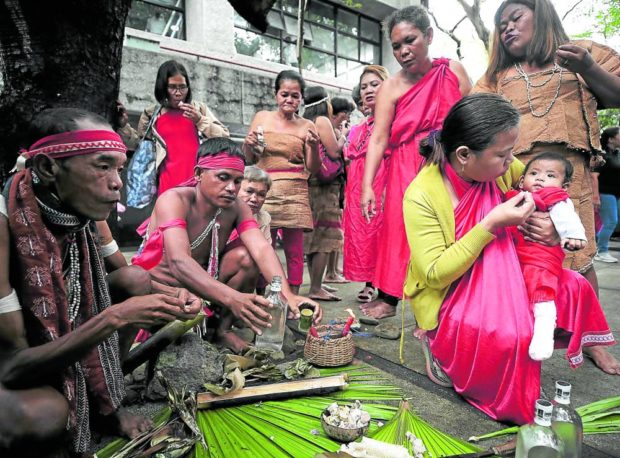Rizal, Quezon IP faction gets P160M for Kaliwa Dam OK

DISTURBANCE SETTLEMENT | Indigenous people belonging to Dumagat-Remontado from Tanay, Rizal province, and General Nakar, Quezon province, perform a ritual at the office of the Metropolitan Waterworks and Sewerage System in Quezon City in thanksgiving for the P160 million “disturbance fee” they received from the MWSS for their nod to the controversial Kaliwa Dam project. (Photo by RICHARD A. REYES / Philippine Daily
MANILA, Philippines — The P12-billion Kaliwa Dam intended to provide water for Mega Manila residents has split Sierra Madre’s indigenous peoples (IPs) into two factions, with both groups staking their claim to ancestral lands on which it would be built.
On one side are the “gemot” (elders) of the Dumagat-Remontados of Tanay, Rizal, and General Nakar, Quezon, who were finally convinced, after eight years of negotiations with the Metropolitan Waterworks and Sewerage System (MWSS) and the National Commission on Indigenous Peoples (NCIP), that the dam would not destroy their ancestral land and cultural heritage.
On Tuesday, they also received from the MWSS a one-time “disturbance fee” of P160 million, with Dumagat gemot Thelma Aumentado calling it a “historic, fortuitous day for us tribespeople … who exercised our agency in accordance with our customs to protect our way of living.”
The fee, said lawyer and NCIP regional officer Josefina Agustin, was compensation for the 160 hectares of ancestral land that would be affected by the dam’s construction. It was “an acknowledgment that the dam has an effect on the lives of the tribespeople … It is a recognition that they are the owners of the ancestral land and there is no transfer of ownership—essentially the government is renting it out,” Agustin added.
‘Yearly payments’
For years, the MWSS has promoted Kaliwa Dam as the answer to Metro Manila’s dwindling water supply. Once finished, the project is expected to provide 600 million liters per day to augment the needs of some 17 million residents in Mega Manila, according to MWSS chair Elpidio Vega.
Article continues after this advertisementOnce the dam becomes operational by 2027, the tribes of General Nakar and Tanay would again be entitled to yearly payouts of P36 million and P10 million, respectively, for 25 years.
Article continues after this advertisementAgustin said the money would be used to fund livelihood projects, scholarships and training in accordance with the tribes’ community resource development and management plans.
“We have long concerned ourselves with how we could uplift the lives of our fellow tribespeople,” said Octavio Pranada, the oldest living “papu” of the Remontado tribe in Tanay. “This turnover is just the beginning and we enjoin the others to stand with us.”
Pranada was referring to their younger members and other tribal groups like the Agta, who continue to oppose the project and are about to complete a nine-day, 148-kilometer protest march from General Nakar to Malacañang Palace. The march, which will end on Feb. 23, is the group’s do-or-die effort to get President Marcos himself to halt the dam’s construction.
“It’s unfair for us to be accused of allowing ourselves to be used by interest groups or by terrorist groups,” said Tata Venus, a gemot from Makid-ata, Quezon province. “We march voluntarily because it is our livelihood at stake here. We would not have to walk hundreds of kilometers if only we were being listened to.”
They claimed that the consultation process was fraudulent and accused the NCIP of railroading by shutting out other gemot from the discussion. The group urged Congress to investigate alleged irregularities in the free, prior and informed consent process for the project and to form an independent fact-finding panel to assess the dam’s long-term cultural and environmental impacts.
“The NCIP should be a defender of the IP, not work as a spokesperson for the MWSS,” Venus added.
The NCIP, however, insisted that those against the project were “given every opportunity to join the discussions.”